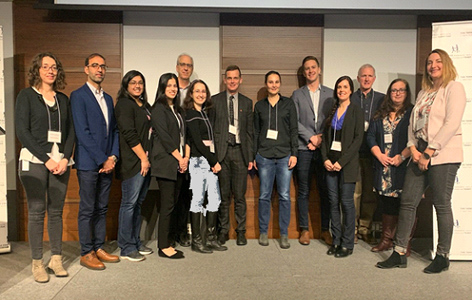
By: Laura Kuhlmann, Postdoctoral Fellow at Princess Margaret Cancer Centre
Founded in 2007, the Terry Fox Research Institute (TFRI) aims to improve diagnosis and treatment for cancer patients by bringing together top researchers and treatment organizations across Canada.
This year’s TFRI Ontario node research symposium was held on December 12th 2019 at the MaRS Collaboration Centre. The event brought together scientists from all over Canada and the United States to discuss the latest advancements in the discovery of novel cancer targets and the development of more efficient cancer therapies.
Dr. Robert Rottapel, TFRI Ontario node leader, kick-started the day, which included 10 oral presentations and 121 poster presentations.
The day featured two keynote speakers: Professor Tim Wilson from the Structural Genomics Consortium, University of North Carolina and Professor Craig Crews from Yale University. Dr. Wilson presented his work in the Kinase Chromogenomic Set, which currently includes 188 narrow-spectrum inhibitors for 211 human kinases, including many so-called “dark” (or poorly studied) kinases. In contrast, Dr. Crews’ talk argued for alternatives to occupancy-driven pharmacology, where compounds that modulate protein function are identified through stoichiometric drug binding and occupation of the binding site (such as kinase inhibitors). Cancer cells often overcome protein inhibitors by overexpressing the target, expressing endogenous ligands, or by acquiring target mutations. Dr. Crews argued that event-driven pharmacology could overcome problems with occupancy-driven pharmacology. This paradigm refers to identifying compounds that lead to the removal of the target protein from the system following drug binding. He offered the example of PROTACs (PROteolysis Targeting Chimera), which are molecules capable of concomitantly binding an E3 ubiquitin ligase and the target protein meant for removal.
Based on the registered poster abstracts, 10 trainees were selected for rapid-fire talks, where speakers had one slide and three minutes to convince the audience to visit their poster.
The three poster award winners were:
Dr. Victoria Hoskin (Queen’s Cancer Research Institute)
Parasvi Patel (University of Toronto and Princess Margaret Cancer Centre)
Noor Shakfa, (Queen’s University and Queen’s Cancer Research Institute)
Congratulations to the winners and thank you to the hosts and volunteers for making the event possible.




